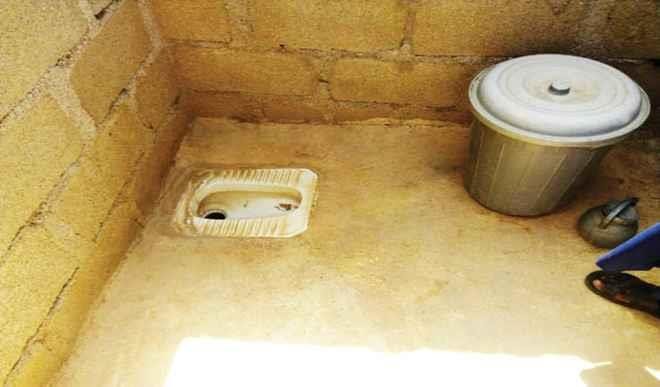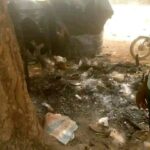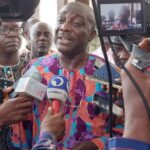
Tsakani, a community outside Dass Local Government Area of Bauchi State was certified and declared as Open Defecation Free (ODF) on Monday, March 5, 2018.
Tsakani is one of the 351 communities of the 13 wards which make up Dass Local Government Area.
The communities, with active support from the United Nations Childrens Fund (UNICEF), the United Kingdom’s Department For International Development (DFID) and the Bauchi State Rural Water Supply and Sanitation Agency (RUWASSA) fought open defecation to a standstill.
Before the advent of the campaign against open defecation in 2013, Tsakani community practiced open defecation because households did not have toilet facilities.
The community has over 25 households with a population of about 200 people and is a fast growing suburb with modern houses springing up.
According to the community’s leader, Ishaya Musa, since the introduction of the campaign to eradicate open defecation, the community had been transformed through hygienic practices which helped in overall improvement of health.
He said in the past, faeces were washed into their water sources leading to rampant cases of diarrhoea, typhoid and other water borne diseases.
“Nobody was even thinking that open defecation was the main reason we were suffering from diarrhoea, typhoid, skin rashes and other diseases because of the contamination of our water sources.
“We didn’t have boreholes at the time. Our only water sources at the time are wells and streams. In the rainy season, we used water contaminated by human waste and in the dry season we used water from wells which were equally contaminated,” he said.
He said improved health had changed their lives because monies spent for treatment in hospitals in the past were now utilised to provide toilets in households, while children were also healthier to be able to attend school.
Sama’ila Zakka, the Tsakani community WASHCOM chairman, said the community had adopted various measures to ensure hygienic practices in and out of their houses.
He said, “In the first place, our sources of water have been improved. Unlike in the past when we used contaminated water from streams and wells, we now have two hand pump boreholes which provide us with clean water.”
He said the water from the wells was now left for laundry and animals to drink.
“We also provided latrines at public places, four toilets in our church, two for males and two for females and they are all cleaned after each use because a large container of water was provided for that purpose,” he said.
He, however, noted that the rapid expansion of settlements in the area came with more demands for toilet facilities in the form of pit latrines or improved ones.
This prompted the introduction of an organised scheme by UNICEF, RUWASSA and members of the communities to provide toilet facilities through an organised thrift system financing.
He said: “We contribute a fixed amount every month. But you know income varies, as a result members of the community who are financially strong contribute more to help the others get toilet facilities in their households. This system has been working for us and every household in the community has at least one toilet.”
The toilets are provided through Toilet Business Owners (TBOs) who liaise with the community leadership or individuals to build the latrines and be paid.
Information from Dass Local Government WASH unit informed that 2,815 Smart Improved Toilets have been provided across communities, 315 have been provided through the Adashe (Thrift) and Microfinance Institutions (MFIs) funded the provision of 79 toilets while 2,421 toilets were provided through household to TBOs across all communities.
A Tsakani community member, Rahila Yunusa, said women in the community had been in the forefront of ensuring hygienic practices in households.
She said they went from household to household to educate women on how to promote hygiene and also held regular meetings and advocacy among the womenfolk.
“We ensure that our children dont defaecate in the open. The grownups must also wash their hands and containers they use in fetching water,” she said.
The Tsakani community WASHCOM Public Relations Officer (PRO), Hosea Nathan, commended UNICEF, DFIDN RUWASSA and others for their support in eradicating open defecation in the community.
He said proper information dissemination and provision of water and sanitation facilities revolutionised the concept of hygiene in all communities leading to improved health with multiplier effects in all facets of their lives.
The campaign to eradicate open defecation in Dass and seven other local government areas of Bauchi State date back to 2010 when UNICEF, supported by DFID, signed an agreement with the state government to implement WASH activities.
The project which covers Gamawa, Warji, Shira, Toro, Bogoro, Ganjuwa and Zaki was executed through the DFID funded Sanitation, Hygiene and Water in Nigeria (SHAWN) project.
The project which was implemented through RUWASSA and Water, Sanitation and Hygiene (WASH) units, was watered down to community levels through the Community-Led Total Sanitation (CLTS) which was complemented with supply of water facilities and adherence to basic hygiene practices.
As a result, all the 351 communities in Dass embraced the programme and have functional Volunteer Hygiene Promoters (VHPs) and hygiene promotion strategies resulted in 70 schools practising hand washing with Tippy Tap (A contraption for washing hands), while 21,198 households across all the 13 wards also practice hand washing.




